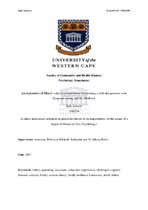| dc.description.abstract | Confronting the realisation that one's child may have a developmental disability presents a
major challenge for any parent. The body of scholarship in this area however, focused mainly
on the role that mothers play highlighting a distinct gap within the literature. In an attempt to
address this, my study aimed to explore the subjective experiences of fathers parenting a
child that presents with dyspraxia during middle childhood. This aim translated into the
following objectives: to understand the subjective experiences of fathers parenting a child
that presents with dyspraxia during middle childhood; to explore the challenges faced by
fathers in parenting a child that presents with dyspraxia during middle childhood and to
identify the support structures available and support required by fathers parenting a child that
presents with dyspraxia during middle childhood. This study was theoretically located within
Bowen's Family Systems Theory and the Family Resilience Framework. Philosophically the
methodology was grounded within an Interpretivist Framework using a qualitative approach.
Consistent with this approach, 14 semi-structured individual interviews were conducted.
Fathers were purposively recruited from across the Cape metropole area and were asked
about their subjective experiences in parenting a child that presents with dyspraxia.
Permission to conduct the study was obtained from the Senate Research Ethics Committee
(Social and Human Sciences) of the University of the Western Cape. Participation was
completely voluntary and could be withdrawn at any stage. Ethics principles were strictly
adhered to throughout the entire process. The transcriptions were subjected to a thematic
analysis in which three thematic domains emerged namely; Experiences, Challenges and
Support. The thematic domain of Experiences revealed their initial reactions, their emotional
responses, their innovative teaching methods and their expectations with regard to their child.
The Challenges thematic domain highlighted issues of health literacy, their sense of
helplessness, how interactions were circumscribed, the acquiescence of the respective schools
and the lack of support that they experienced. The Support thematic domain revealed the
external and internal support sources for these fathers. Based on the findings of the study, the
recommendations are to create an informal support network of parents and health
professionals to share information and to offer a practical guide for parents to utilise in the
treatment of their child at home. The findings also revealed that alternative understandings of
fathering need to be developed to enable new and more equal ways of being both fathers and
men and mothers and women. This is necessary to challenge the limiting essential notions of
what is possible for men and women. | |

